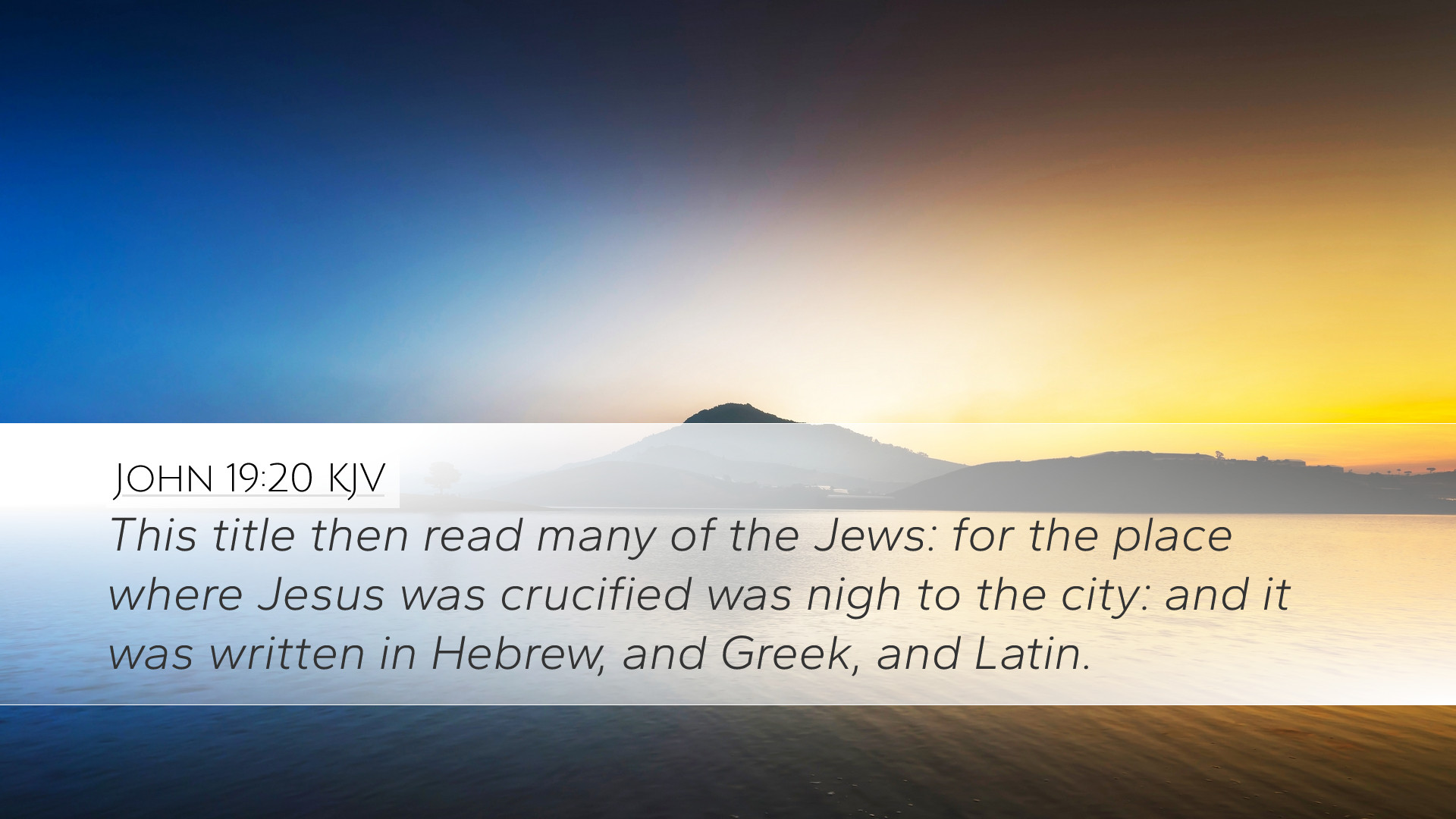Commentary on John 19:20
John 19:20 states: "And Pilate wrote a title, and put it on the cross. And the writing was, JESUS OF NAZARETH THE KING OF THE JEWS." This verse, central to the Passion narrative, offers profound insights into Jesus’ identity, the nature of His kingship, and the fulfillment of prophecies.
Context and Background
This verse occurs during the Crucifixion of Jesus, following His trial before Pontius Pilate. Pilate's initial reluctance to condemn Jesus is overridden by the pressure from the Jewish leaders and the crowd. The inscription placed on the cross serves as a political statement, yet it also proclaims theological truths. It is essential to consider both the immediate and broader historical contexts of this moment.
The Title Inscription
The inscription itself—"JESUS OF NAZARETH THE KING OF THE JEWS"—carries significant implications:
- Identification of Jesus: The title is indicative of Jesus' earthly origins, linking Him to Nazareth, a town often looked down upon. This humble beginning contrasts sharply with the exalted title of "King."
- Nature of His Kingship: Jesus’ kingship does not align with worldly expectations. His rule is characterized by humility and sacrifice, rather than the political might and glory associated with earthly kings.
- Prophetic Fulfillment: This event fulfills prophecies from the Old Testament concerning the Messiah, notably those found in Psalm 22 and Isaiah 53, both pointing toward a suffering servant who would be scorned by men.
The Role of Pontius Pilate
Pilate's actions in inscribing this title reveal much about his character and the political climate of the time:
- Reluctance and Determination: Despite his personal doubts about Jesus’ guilt, Pilate ultimately gives in to the demands of the crowd. This underscores the pressure that political leaders often face from public sentiment.
- Irony of Kingship: Pilate’s proclamation, though meant to mock, ironically affirms the true nature of Jesus' mission. The veracity of His kingship is unrecognized by those who seek to belittle Him.
Theological Implications
The words inscribed above Jesus while on the cross pose a number of theological reflections:
- The Universality of Christ’s Kingship: The proclamation was written in three languages: Hebrew, Latin, and Greek, suggesting that Jesus’ reign and His message transcend cultural and linguistic boundaries, presenting a king for all humanity.
- Reversal of Expectations: By presenting Jesus as a king in a moment where He is at His weakest—crucified and mocked—John’s Gospel highlights the paradox of the Kingdom of God where the last shall be first and strength is made perfect in weakness.
- Judgment and Redemption: Here, judgment is passed upon Jesus, yet it simultaneously provides the means for humanity’s redemption. The cross, an instrument of death, becomes the very source of salvation.
Responses and Reactions
The reactions of the Jewish leaders and bystanders further illustrate the significance of this moment:
- The Jewish Leaders' Protest: They object to the title, wishing to modify it to reflect that Jesus claimed to be king, thus denying His true authority.
- The Bystanders’ Mockery: The crowd’s scorn points to the preconceived notions of kingliness. They fail to see that this is indeed the culmination of God’s redemptive plan.
Conclusion
In John 19:20, the phrase "JESUS OF NAZARETH THE KING OF THE JEWS" serves as a profound declaration of Jesus' identity and purpose. It encapsulates the contrast between earthly expectations of power and prestige and the divine nature of Christ’s mission. For pastors, students, theologians, and scholars, the insights drawn from this verse invite deeper reflection on the nature of power, the meaning of true kingship, and ultimately, the kind of kingdom that Jesus came to establish. In embracing the apparent paradoxes of the cross, believers are called to understand and emulate the humility and sacrificial love that Jesus exemplified.


